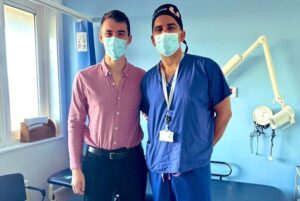
The first robotic day-case nephrectomy at the Royal Free Hospital has been performed by Ravi Barod (Royal Free Hospital, London, UK), marking progress in use of the technology for kidney procedures. It has previously been performed in the United States and utilised for different forms of nephrectomy at Wolverhampton’s New Cross Hospital. Barod has spoken exclusively about the procedure to Renal Interventions, exploring its outcome and the opportunities the technology presents to kidney specialists.
Around 450 nephrectomies are performed each year at the Royal Free Hospital. The pressures in the NHS as the winter begins as well as a desire “to improve the patient experience” sparked Barod’s decision to try day-case robotic nephrectomy for the first time at the hospital, for select patients. He outlined how robotic surgery, the most advanced type of minimally invasive surgery, was the most common type the hospital performed.
That team has also developed an “enhanced recovery program” to accompany these surgeries, which reduced hospital stays from around five days with open surgery to around two days with robotics. “The natural progression of this,” Barod suggested, “was for some of those patients to go home and sleep in their own bed. We know that patients who are mobilised early and have a much quicker initial recovery after surgery then have a quicker return to their normal activity. The shorter you’re in hospital, the quicker your recovery and return to normal.”
The surgery was performed on 26 November with no catheter and one Venflon cannula on a young adult male patient with very few other medical problems, besides a failed kidney. He also lived near to the Royal Free Hospital; Barod said that it was important “early on to select for patients with no comorbidities who have the ability to get back to the hospital within a short period of time in case we had any concerns.”
With the nephrectomy performed, he was “in and out of hospital within twelve hours,” after which Barod used a variety of remote monitoring tools after the surgery to maintain awareness of his condition. The patient was also able to keep track of his own electrocardiogram (ECG) and pulse rate, and was given the opportunity to ask Barod any questions via video call. Barod said that the most important use of remote monitoring technology, when combined with the ability to quickly get back in touch with their doctor, was to improve “patient confidence and motivation,” breaking the misplaced conviction among some patients that surgery had to be recovered from in hospital.
Distinguishing between nephrectomies for kidney failure and tumours, Barod stated that “there’s no reason that [robotic nephrectomy] can’t be rolled out for patients with cancer,” but that it is more appropriate for cancers that “are not too complex to remove.” Comorbidities may also make the procedure inappropriate for some patients. Most of those who can undergo it, however, would likely be day cases, he said.












